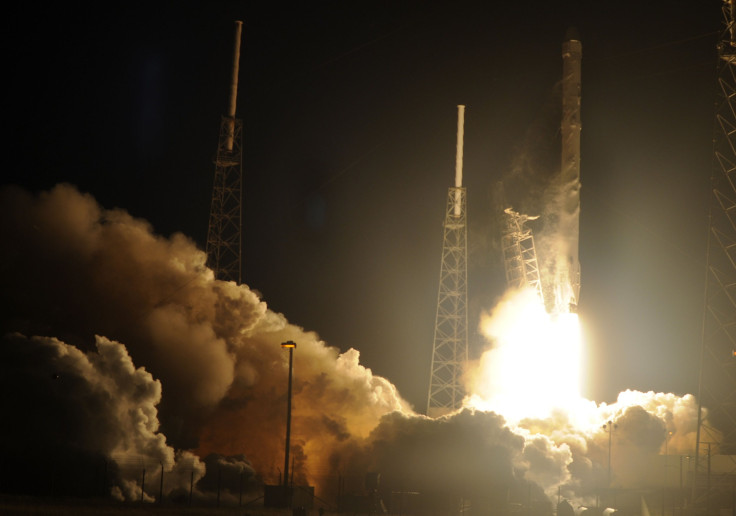SpaceX Falcon 9 Rocket Launch Failure: Video Of Rocket Breaking Into Pieces After 'Anomaly Ascent'

Update 12:57 PM EDT: NASA Administrator Charles Bolden has released a statement on the loss of the SpaceX rocket and caro supplies.
“We are disappointed in the loss of the latest SpaceX cargo resupply mission to the International Space Station. However, the astronauts are safe aboard the station and have sufficient supplies for the next several months. We will work closely with SpaceX to understand what happened, fix the problem and return to flight. The commercial cargo program was designed to accommodate loss of cargo vehicles. We will continue operation of the station in a safe and effective way as we continue to use it as our test bed for preparing for longer duration missions farther into the solar system. "
"Today's launch attempt will not deter us from our ambitious human spaceflight program.”
Read Bolden's full statement here.
Original story: SpaceX’s Falcon 9 rocket -- headed from the Cape Canaveral Air Force Station in Florida to the International Space Station (ISS) orbiting the Earth on a supply mission -- broke into pieces just minutes after launching Sunday, NASA confirmed. The U.S. space agency will be holding a press conference soon to discuss the incident in more detail.
Asked the wife if it was an explosion. Yes Kerelle, it exploded. #SpaceX pic.twitter.com/leXssn96ky
- Kerelle Sampson (@KerelleSampson) June 28, 2015Nasa's unmanned @SpaceX rocket explodes at start of #ISScargo supply mission pic.twitter.com/ZmJ6cNJE2Q
- BBC Breaking News (@BBCBreaking) June 28, 2015SpaceX was not immediately able to pinpoint what had gone wrong in the ascent, but the aerospace company has assembled a team to investigate:
The vehicle experienced an anomaly on ascent. Team is investigating. Updates to come.
- SpaceX (@SpaceX) June 28, 2015SpaceX CEO Elon Musk indicated on Twitter that his company would provide more information about the incident after its investigation:
Falcon 9 experienced a problem shortly before first stage shutdown. Will provide more info as soon as we review the data.
— Elon Musk (@elonmusk) June 28, 2015
There was an overpressure event in the upper stage liquid oxygen tank. Data suggests counterintuitive cause.
— Elon Musk (@elonmusk) June 28, 2015
That's all we can say with confidence right now. Will have more to say following a thorough fault tree analysis.
— Elon Musk (@elonmusk) June 28, 2015
The primary mission objective was to deliver a robotic Dragon cargo capsule, which was carrying more than 2.5 tons of supplies and equipment and other experimental materials to the ISS.
SpaceX had some technical issues with its Falcon 9 rocket in the past. In early January, SpaceX aborted a Falcon 9 rocket launch, citing technical glitches during last-minute testing.
Both in January and April, SpaceX experimented with soft landings of its rockets, in conjunction with its efforts to make a “reusable rocket.” Musk and his company have expressed the hope that reusing rockets will make space travel cheaper and more sustainable. Unfortunately, neither experiment went all that well. The firm had planned to make another attempt this time around by soft-landing its rocket on a barge in the Atlantic Ocean.
Setbacks like these are common in space programs, as observed by NASA astronaut Scott Kelly, who witnessed the explosion of the rocket from his front-row seat aboard the ISS:
Watched #Dragon launch from @space_station Sadly failed Space is hard Teams assess below @NASAKennedy #YearInSpace pic.twitter.com/myi3col5Ix
— Scott Kelly (@StationCDRKelly) June 28, 2015© Copyright IBTimes 2025. All rights reserved.






















